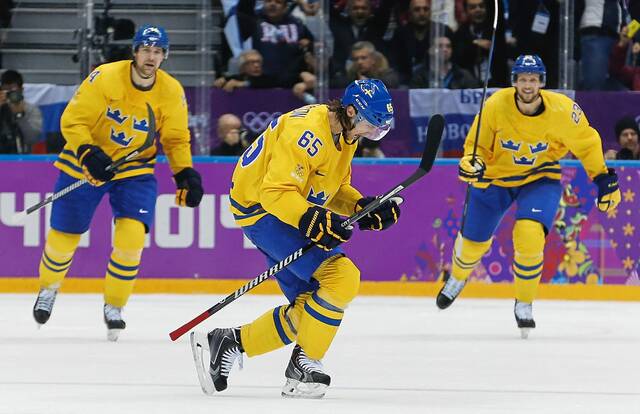While the NHL is on hold because of the ongoing coronavirus pandemic, the Tribune-Review will offer the Double Team project, an examination of the five best players who have contributed substantially to the Penguins and another franchise. For consideration, a player must have played at least the equivalent of a full season for each franchise. (Sorry, Jarome Iginla fans.)
Today, a look at the Washington Capitals. One of the Penguins fiercest rivals, the Capitals, named for the center of the United States’ federal government, came into the existence as an expansion team in 1974.
In 228 all-time games against the Capitals, the Penguins have a 112-95-21 record.
1. Sergei Gonchar, defenseman
Roughly a decade before the arrival of Alex Ovechkin, Gonchar was the Russian the Capitals hoped would lead the franchise to glory. And for the most part, he was a productive player and a good teammate on some strong regular-season squads. But ultimately, he was viewed as a significant part of some underachieving teams that usually fell short in the playoffs.
Drafted No. 14 overall in 1992, Gonchar debuted during the lockout-shortened 1994-95 season, appearing in 31 games and posting seven points. His first full NHL season was 1995-96, and he played in 78 games while contributing 41 points.
The Capitals’ greatest pre-Ovechkin success came in 1997-98, when the franchise reached the Stanley Cup Final for the first time, losing to the Detroit Red Wings. Gonchar appeared in 72 games during the regular season but only recorded 21 points. His contribution in the postseason was far greater as he had 11 points, including a team-leading seven goals, in 21 games.
By 1999-2000, he had developed into a regular threat to reach the 50- or 60-point plateau — no small achievement during the “dead puck” era — and was selected to the All-Star Game three times while in Washington. A member of the Capitals for parts of 10 seasons, Gonchar is 15th in franchise history with 416 points in 654 games.
By the 2004 trade deadline, the Capitals opted to begin rebuilding and dealt Gonchar to the Boston Bruins.
Following the 2004-05 lockout, the Penguins, thanks to the new economic landscape the new collective bargaining agreement created, were aggressive in free agency, and one of their biggest targets was Gonchar. He was signed to what was a then-massive five-year deal worth $5 million per season.
The Penguins stumbled through the 2005-06 campaign and missed the playoffs. Gonchar, despite putting up 58 points in 75 games, was the target of fans unsatisfied with the team’s failings.
But by the following season, the Penguins, under new general manager Ray Shero, rebounded, reaching the playoffs for the first time in six years. Gonchar posted 67 points in 82 games and, more importantly, he served as a mentor for rookie forward Evgeni Malkin, a fellow Russian.
Gonchar was selected for his fourth career All-Star Game in 2007-08 as he scored 65 points in 78 games and guided a team of several teenagers and twenty-somethings to the franchise’s third Stanley Cup Final appearance, losing, again, to the Red Wings.
In 2009-10, Gonchar missed most of the season after suffering a preseason shoulder injury. During the 2009 postseason, despite being hobbled by a knee injury, Gonchar put up 14 points in 20 games and earned his first Stanley Cup ring.
By the 2010 offseason, he joined the Ottawa Senators as a free agent.
2. Kevin Hatcher, defenseman
Eight years before Gonchar, the Capitals selected the Michigan-born Hatcher with the No. 17 overall pick of the 1984 draft, and he spent parts of nine seasons in Washington.
Debuting in 1984-85, Hatcher was more of a role player his first three NHL seasons before taking on a more prominent role offensively, breaking the 40-point barrier in 1987-88 with 41 points in 71 games.
Despite his considerable size at 6-foot-3 and 230 pounds, Hatcher was never a physical player. His game was offense, and that’s how he became a three-time All-Star in Washington.
He was selected for his first All-Star Game in 1989-90 by putting up 54 points in 80 games. During 1990-91, he followed that by leading the team with 24 goals and 74 points in 79 games.
Hatcher’s signature season of 1992-93 saw him set career highs of 34 goals and 79 points in 83 games while also serving as captain. His 34 goals remain a single-season franchise record for defensemen.
But as was the case for most of their pre-Ovechkin existence, the Capitals never got far in the playoffs during Hatcher’s tenure, and in January 1995, he was traded to the Dallas Stars.
By June 1996, he was on the move again. The Penguins, wanting an older player who they felt was solid defensively, made a curious trade for Hatcher, then 30, straight up for Sergei Zubov, a 26-year-old with a world of offensive skills.
Zubov went to become a Hockey Hall of Famer with the Stars. Meanwhile, Hatcher had a solid three seasons with the Penguins and reached the All-Star Game in 1997 but certainly didn’t offer enough to prevent the transaction becoming one of the worst in the Penguins’ history.
Hatcher’s best season with the Penguins was his first as he played in 80 games and recorded 54 points in 1996-97.
After that, his production gradually declined while playing for defensive-minded coach Kevin Constantine. By September 1999, he was traded to the New York Rangers.
One of the most prolific American-born defensemen in NHL history, Hatcher was inducted into the United States Hockey Hall of Fame in 2010.
3. Larry Murphy, defenseman
Beginning his career with the Los Angeles Kings, Murphy was productive in California but rarely got much attention given most of his games were played on the West Coast, well before the Internet or other technology made all contests readily available to view in other parts of North America.
A trade to the Capitals in October 1983 allowed Murphy a greater showcase for his abilities.
After his offensive production gradually climbed from 46 to 56 to 65 points his first three seasons in Washington, he broke out in 1986-87 by leading the team with 81 points in 80 games and was named to the NHL’s second-team All-Stars after the season.
After that success, Murphy’s offense began to dwindle with the Capitals. Things got so bad over the next two seasons, fans began to chant “Whoop! Whoop! Whoop!” anytime No. 55 touched the puck (a legacy Gonchar would, unfortunately, inherit when he donned that number).
By March 1989, Murphy was dealt to the Minnesota North Stars. His stay with that franchise was brief as the Penguins acquired him in December 1990. Meshing well with the team’s skilled forwards such as Mario Lemieux and Mark Recchi, Murphy, filling in for injured defenseman Paul Coffey, set a still-standing franchise postseason record for defensemen with 23 points in 23 games while helping the Penguins win the Stanley Cup for the first time.
After Coffey was traded midway through the 1991-92 campaign, Murphy took over as the No. 1 defenseman and put up 77 points in 77 games, then lifted the Stanley Cup again that spring.
Murphy’s signature season of 1992-93 saw him post a career-best of 85 points in 83 games on a team that produced four 100-point scorers in forwards Lemieux (160), Kevin Stevens (111), Rick Tocchet (109) as well as Ron Francis (100) and claimed the Presidents’ Trophy as the league’s best squad in the regular season.
An All-Star with the Penguins in 1994, Murphy was on the move again in July 1995 when the Penguins, wanting to get younger (i.e. cheaper), dealt Murphy to the Toronto Maple Leafs.
Having played in 1,615 career games, second-most in NHL history among defensemen, Murphy was inducted into the Hockey Hall of Fame in 2004.
4. Jaromir Jagr, right winger
Lots of fans on both sides of this rivalry might cringe seeing this name on this list. After all, the 2001 blockbuster trade that sent Jagr from Pittsburgh to Washington was ultimately a clunker for both sides.
But that doesn’t mean Jagr wasn’t good during his three years in the copper and black of the Capitals.
The problem was Jagr was merely good with the Capitals. Not great as he was with the Penguins.
His first season in Washington was his best with the Capitals. He led the team with 79 points in 69 games and was selected to the All-Star Game, but the Capitals were a massive disappointment, missing the playoffs.
The Capitals returned to the postseason in 2002-03 thanks to Jagr again leading the team with 77 points in 75 games, but they were eliminated in the Eastern Conference quarterfinal round.
By the 2004 trade deadline, the Capitals were going nowhere, and with a lockout looming, they decided to rebuild. Pulling the plug on their grand experiment with Jagr, they dealt him to the Rangers in January 2004.
More than a decade earlier, Jagr was the No. 5 overall pick in the 1990 draft. The teenager from Czechoslovakia helped the Penguins win their first two Stanley Cup titles in 1991 and ‘92.
The second-leading scorer in NHL history with 1,921 career points, he did most of that damage with the Penguins. His 1,079 career points in a Penguins sweater are third-most in franchise history.
A six-time All-Star with the Penguins, Jagr claimed the Art Ross Trophy as the league’s top scorer five times in Pittsburgh and claimed the Hart Trophy as league MVP in 1998-99.
5. Brooks Orpik, defenseman
With apologies to superstars such as Sidney Crosby and Evgeni Malkin, Brooks Orpik was the first component to the Penguins’ rebuild in the mid-2000s. A first-round pick in 2000, Orpik broke through as a full-time NHLer with a terrible 2003-04 Penguins team, appearing in 79 games and posting 10 points as well as a team-leading 127 penalty minutes.
As the likes of Crosby, Malkin, goaltender Marc-Andre Fleury and Kris Letang began arriving in Pittsburgh, Orpik helped oversee the team develop from laughingstock to championship contender, and by 2008, they had reached the Stanley Cup Final.
Blessed with minimal offensive skill, Orpik’s game was defense and hitting. Those attributes helped the Penguins defeat the Red Wings for the Stanley Cup in 2009.
An alternate captain for many seasons, Orpik was one of the team’s most respected leaders throughout his time with the franchise. His 703 games over 11 seasons are the second-most in franchise history among defensemen.
When he became a free agent in the summer of 2014, Orpik’s experience and leadership prompted the Capitals to break the bank and sign the then 33-year-old to a five-year contract worth $5.5 million per season.
Teamed primarily with defenseman John Carlson, Orpik helped develop him into an All-Star while largely changing the culture of the team.
An alternate captain throughout his five seasons in Washington, Orpik was a key part of four Atlantic Division titles as well as two Presidents’ Trophy wins as the league’s top overall regular-season team.
But his lasting legacy with the Capitals will be the franchise’s ultimate triumph, their first Stanley Cup title in 2018. During Game 2 of the Final against the Vegas Golden Knights, Orpik scored the winning goal of a 3-2 road win.
Following the 2018-19 season, Orpik retired.
Honorable mention: Robert Lang, center; Eric Fehr, center; Matt Niskanen, defenseman; Dave Tippett, center; Bryan Watson, defenseman.








